Alison Saunders, Director of Public Prosecutions cites "a particularly challenging case" in which people from Slovakia and the Czech Republic were kept in cellars or in crowded rooms" many of whom had mental health problems and learning disabilities. Seven people were sent to jail for a total of 40 years.
"They were controlled by threats of violence and intimidation, were provided with only small amounts of food and told they needed to pay back the money they owed for transport and housing," Alison Saunders said in a statement.
Overall, there's been a 27 percent rise in the number of people charged with modern slavery and human trafficking offenses since last year, according to new figures published in Britain's Crown Prosecution Service (CPS) Modern Slavery Report, 2017-18. The CPS says 239 suspects have been charged with trafficking offenses in the last year. However, only 185 people were found guilty in the same period, a drop from 192 in 2016.
The CPS #modernslavery report highlights our efforts in 2017-18 to disrupt, prosecute and improve our response to offending, both in the UK and abroad. Read more here: https://t.co/rjxOSKWboT pic.twitter.com/1wpljQBkG0
— CPS (@cpsuk) August 9, 2018
READ MORE: 'Reckless' People Traffickers Face Jail After Albanians Nearly Sank in Channel
Human traffickers made fortune smuggling Albanians across the Channel https://t.co/eb9bPrdQV7
— CourtNewsUK (@CourtNewsUK) August 7, 2018
#ModernSlavery costs UK up to £4.3bn a year, says Home Office report. Unsurprising given how lucrative the crime is and where some of that money is made from. And, unlike drugs, people can be sold over and over again. pic.twitter.com/fTy5f2CjVv
— Sian Bevan (@sian_bevan) August 1, 2018
Meanwhile, anti-trafficking campaigners have told Thomson Reuters Foundation there's been a stall in convictions since the Modern Slavery Act was passed in 2015.
Despite the rise in suspects being charged with modern slavery offenses, up by 27 percent, the number of convictions has not increased significantly. Only 185 people were found guilty in the same period, a drop from 192 in 2016.
"We have yet to see any significant increase in the rate of convictions of those who traffick and enslave people," Kate Roberts, head of the Human Trafficking Foundation told Thomson Reuters Foundation.
"This underlines the importance of empowering and supporting victims to speak out and come forward to the authorities," says Kate Roberts.
It takes on average three years to prosecute modern slavery crimes — which is double the amount of time it took in 2015, the new CPS report says, which "reflects the challenges… greater complexities, multiple defendants and multiple victims."
READ MORE: 'If There Are Gangs. There's Sexual Exploitation' — Ex Gang Member Tells Sputnik
Victims are often too scared to speak out, or unaware they are being controlled and treated like a modern slave; the average number of victims and witnesses gave support to provide evidence in court in modern slavery cases is slowly increasing from an average of three in 2011 to almost 8 in 2017-18.
#Modernslavery is happening now:
— MdrnSlavery Helpline (@MSHelpline) August 9, 2018
What is modern slavery?
What's being done to stop it?
What are the signs?
What should you do if you suspect it is taking place?
This guide from @ASPolice has the answers. https://t.co/PHxohsPGxz
READ MORE: 'Tragic Scale' of Modern Slavery in Britain Revealed in 'Landmark' Report


